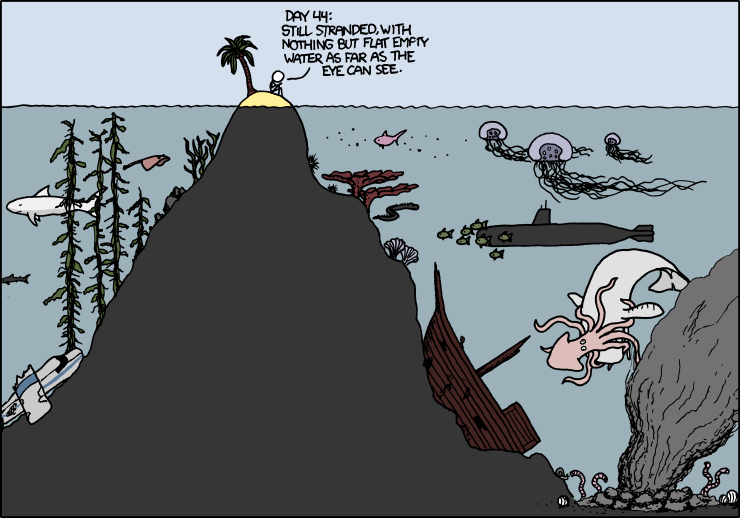So, instead, let's talk about the use of language.
Wuthering Heights has some great imagery and word choice in it. There is a certain art to fitting together words and sentences to form a coherent whole-- and I must admit that Emily Brontë is a master of the art. Joseph's indecipherable dialect aside, she produces sentences such as:
One time, however, we were near quarrelling. He said the pleasantest manner of spending a hot July day was lying from morning till evening on a bank of heath in the middle of the moors, with the bees humming dreamily about among the bloom, and the larks singing high up overhead, and the blue sky and bright sun shining steadily and cloudlessly. That was his most perfect idea of heaven's happiness — mine was rocking in a rustling green tree, with a west wind blowing, and bright white clouds flitting rapidly above; and not only larks, but throstles, and blackbirds, and linnets, and cuckoos pouring out music on every side, and the moors seen at a distance, broken into cool dusky dells; but close by great swells of long grass undulating in waves to the breeze; and woods and sounding water, and the whole world awake and wild with joy. He wanted all to lie in an ecstasy of peace; I wanted all to sparkle and dance in a glorious jubilee. I said his heaven would be only half alive, and he said mine would be drunk; I said I should fall asleep in his, and he said he could not breathe in mine. (237)
Brontë's skill clearly exceeds my own. She has good control of a reader's response and the flow of the writing; by using a long list of birds for Catherine's heaven and a simpler one with more gradual phrases for Linton's, for instance, she influences the reader's mood and impression.
However, I think it would be fascinating to consider what Brontë could do in a different writing environment.
However, I think it would be fascinating to consider what Brontë could do in a different writing environment.
This is a piece called Crab Canon, by the renowned graphic artist M. C. Escher, also known for such gems as Waterfall and Drawing Hands. It may have been inspired by a Bach piece of the same name, one of the Musical Offerings:
This piece is interesting in that it is completely reversible; indeed, the reversed part may be overlaid on the first part to create harmony as well. In addition to showcasing Bach's musical talent, this piece also presents the foundation for a certain type of literary challenge, also called a crab canon. A crab canon is a piece of literature which can be read in either direction and present a coherent story. It is usually presented as a dialogue, as in the original literary crab canon, but can also be presented in other forms:
Authors like Emily Brontë tend to be comfortable with the manipulation of phrases, sentences, and tone. They've clearly demonstrated what they can do in the framework of a novel-- but, at the same time, I believe that writing within constraints can show entirely different facets of a writer's talents.
For instance, though they can be frustrating to write, haikus are some of the most expressive poems; the feeling that ordinarily would be spread across many verses must be compressed into a mere 17 syllables. Meaning must be overlaid, implied, and hidden. The same could be said for the six-word stories we discussed in class. And although a crab canon does not necessarily need to hide meaning-- Hofstadter's doesn't-- the form lends itself to the reinforcement of certain themes, and the Lost Generation video certainly takes advantage of that. Given the many past / present parallels in Wuthering Heights, perhaps Brontë could have done the same.
What do you think? Would her literary talents be wasted on a restrictive form of writing? Or would the restrictions create a more intriguing and lasting piece?
This piece is interesting in that it is completely reversible; indeed, the reversed part may be overlaid on the first part to create harmony as well. In addition to showcasing Bach's musical talent, this piece also presents the foundation for a certain type of literary challenge, also called a crab canon. A crab canon is a piece of literature which can be read in either direction and present a coherent story. It is usually presented as a dialogue, as in the original literary crab canon, but can also be presented in other forms:
Authors like Emily Brontë tend to be comfortable with the manipulation of phrases, sentences, and tone. They've clearly demonstrated what they can do in the framework of a novel-- but, at the same time, I believe that writing within constraints can show entirely different facets of a writer's talents.
For instance, though they can be frustrating to write, haikus are some of the most expressive poems; the feeling that ordinarily would be spread across many verses must be compressed into a mere 17 syllables. Meaning must be overlaid, implied, and hidden. The same could be said for the six-word stories we discussed in class. And although a crab canon does not necessarily need to hide meaning-- Hofstadter's doesn't-- the form lends itself to the reinforcement of certain themes, and the Lost Generation video certainly takes advantage of that. Given the many past / present parallels in Wuthering Heights, perhaps Brontë could have done the same.
What do you think? Would her literary talents be wasted on a restrictive form of writing? Or would the restrictions create a more intriguing and lasting piece?
,_ENT.jpg)
